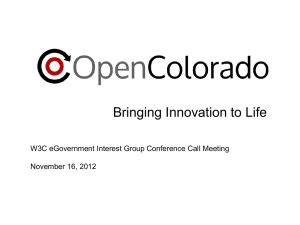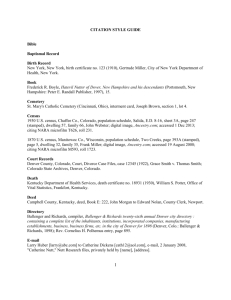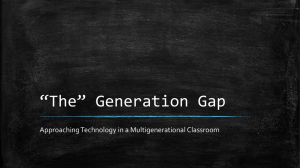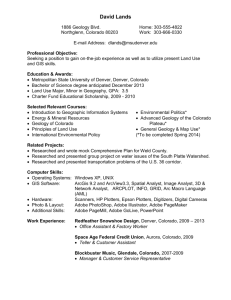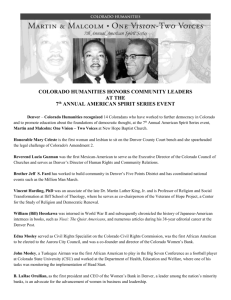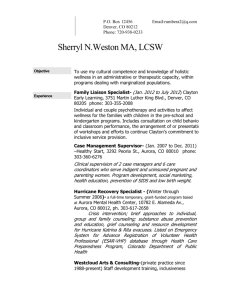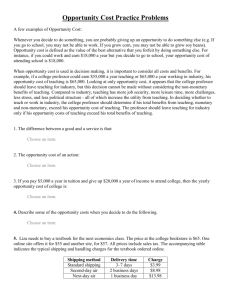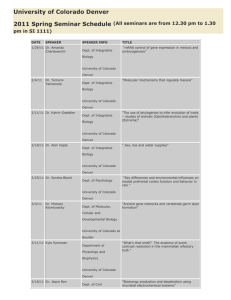Colorado Bioscience - Community College of Aurora
advertisement
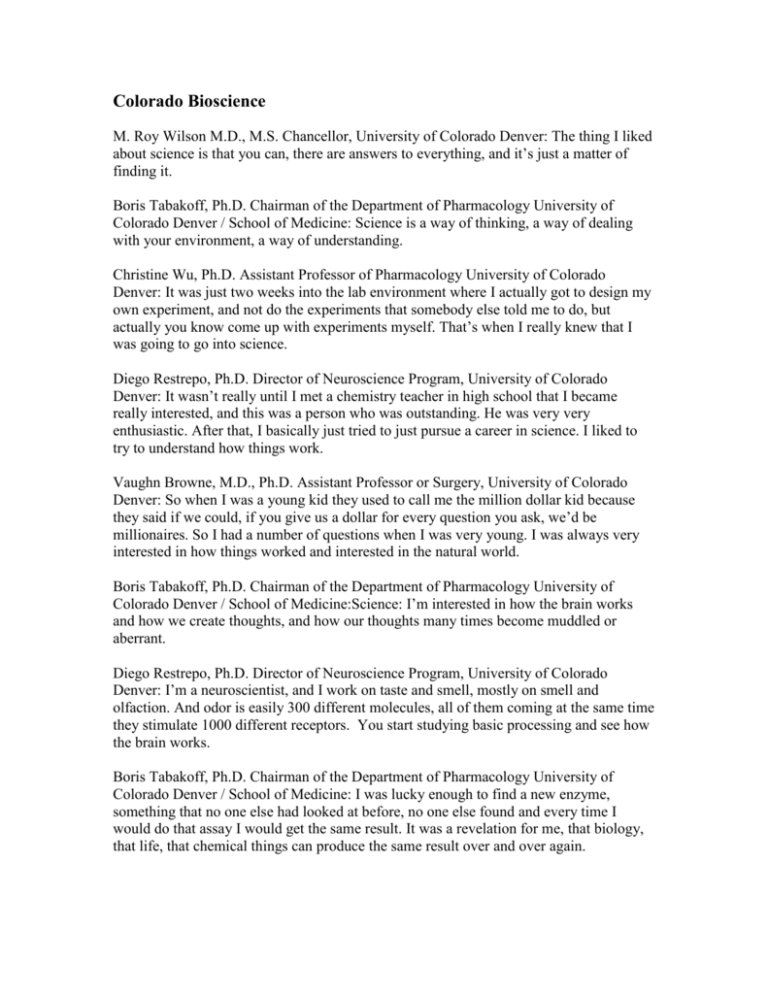
Colorado Bioscience M. Roy Wilson M.D., M.S. Chancellor, University of Colorado Denver: The thing I liked about science is that you can, there are answers to everything, and it’s just a matter of finding it. Boris Tabakoff, Ph.D. Chairman of the Department of Pharmacology University of Colorado Denver / School of Medicine: Science is a way of thinking, a way of dealing with your environment, a way of understanding. Christine Wu, Ph.D. Assistant Professor of Pharmacology University of Colorado Denver: It was just two weeks into the lab environment where I actually got to design my own experiment, and not do the experiments that somebody else told me to do, but actually you know come up with experiments myself. That’s when I really knew that I was going to go into science. Diego Restrepo, Ph.D. Director of Neuroscience Program, University of Colorado Denver: It wasn’t really until I met a chemistry teacher in high school that I became really interested, and this was a person who was outstanding. He was very very enthusiastic. After that, I basically just tried to just pursue a career in science. I liked to try to understand how things work. Vaughn Browne, M.D., Ph.D. Assistant Professor or Surgery, University of Colorado Denver: So when I was a young kid they used to call me the million dollar kid because they said if we could, if you give us a dollar for every question you ask, we’d be millionaires. So I had a number of questions when I was very young. I was always very interested in how things worked and interested in the natural world. Boris Tabakoff, Ph.D. Chairman of the Department of Pharmacology University of Colorado Denver / School of Medicine:Science: I’m interested in how the brain works and how we create thoughts, and how our thoughts many times become muddled or aberrant. Diego Restrepo, Ph.D. Director of Neuroscience Program, University of Colorado Denver: I’m a neuroscientist, and I work on taste and smell, mostly on smell and olfaction. And odor is easily 300 different molecules, all of them coming at the same time they stimulate 1000 different receptors. You start studying basic processing and see how the brain works. Boris Tabakoff, Ph.D. Chairman of the Department of Pharmacology University of Colorado Denver / School of Medicine: I was lucky enough to find a new enzyme, something that no one else had looked at before, no one else found and every time I would do that assay I would get the same result. It was a revelation for me, that biology, that life, that chemical things can produce the same result over and over again. Christine Wu, Ph.D. Assistant Professor of Pharmacology, University of Colorado Denver: In a nut shell we’re trying to find cancer biomarkers, and we’re able to monitor proteins that are molecules in the cell, and we’re able to monitor differences between cancer cells and normal cells so that we can find the proteins that signify cancer so that we can have a method of detection of cancer. M. Roy Wilson M.D., M.S. Chancellor, University of Colorado Denver: We have about 5500 core bloods that have been collected locally within the state of Colorado, stored on site and available for transplants all around the world. They may call me and say we’ve got a new patient, this patient has a very aggressive form of leukemia he’s stat; he’s on the top of your list, and you have to use all the tools available to you to pick the right donor, and that interaction will call a search consultation is a large part of what I do. Patsy Ruegg, HT(ASCP), QIHC Histotechnologist and Owner of IHCtech: If you go to surgery and the surgeon removes something from your body it has to go to the laboratory and it has to be looked at by a pathologist under the microscope. And what the pathologist tells the doctor about what’s wrong with your tissue determines how patients are treated for breast cancer or any kind of other diseases. Clay Anselmo, President of Reglera: We’re involved in bringing products to the patient. Taking them from a concept and creating a real world product, and to me that’s where the excitement is. You know it’s a wonderful thing to think of a new technology, but when you can go to work everyday and say things I’m bringing to the market are going to save thousands and thousands of lives it’s amazingly powerful, and that’s what we’re involved with on a daily basis. Christine Wu, Ph.D. Assistant Professor of Pharmacology, University of Colorado Denver: When I was an undergrad even, I didn’t know that there would be so much writing involved with science, but once you’ve discovered something you have to be able to communicate it to other people. Vaughn Browne, M.D., Ph.D. Assistant Professor or Surgery, University of Colorado Denver: I spend a lot of time trying to write down my ideas, write down the observations we’ve made and connect those observations to a body of literature that exits in the scientific world so that we can get a better understanding of how our discoveries fit into the broader world of science. M. Roy Wilson M.D., M.S. Chancellor, University of Colorado Denver: The things that I learned in medical school are no longer relevant because the information has changed that much. We didn’t have things like genomics and pharmacogenetics when I went to medical school, and yet those are the biggest hottest topics right now. David Mayorga, President of D.A.M. Good Consulting, Partner with Global Alliance: There’s always what’s new and what are we going to create now, and that’s what makes science pretty exciting. Vaughn Browne, M.D., Ph.D. Assistant Professor or Surgery, University of Colorado Denver: You really get to ask great questions, and you get to be on the cutting edge of discovery. David Mayorga, President of D.A.M. Good Consulting, Partner with Global Alliance: They’re still looking for a lot of cures, they’re still looking for cures for cancer, Alzheimer’s, all types of things. So, definitely the biotechnology and pharmaceutical companies are looking for new blood to bring into their companies to bring in new ideas, and try to figure some of these things out. Clay Anselmo, President of Reglera: There are a huge variety of careers in biosciences, I mean amazing variety. Many of the companies that are here in Colorado, and there is quite a large contingent of bioscience companies here, they’re not big on advertising. David Mayorga, President of D.A.M. Try to get a summer job with one of the local companies. Clay Anselmo, President of Reglera: Almost everybody has an internship program. David Mayorga, President of D.A.M.: Primarily network, network that’s my number one recommendation. And again, try to see if you can get into something related to that industry. Michael Aubrey, M.S., C.H.S., Chief Operating Officer of ClinImmune Labs: We have tremendous respect for people who work through college, and if they come out of college with a 3.0, but they worked full time that counts so much in their favor. Clay Anselmo, President of Reglera: If you want to stay here, you can stay here and be in this industry, and be successful. Patsy Ruegg, HT(ASCP), QIHC Histotechnologist and Owner of IHCtech: At the moment there’s a large shortage of trained people to work in histotechnology. Clay Anselmo, President of Reglera: We’ve been growing at over 20% for our entire history, and I think that’s indicative of the entire bioscience industry. David Mayorga, President of D.A.M. Good Consulting, Partner with Global Alliance: The Governor is bringing in, or making an effort to bring in more resources here, especially in the renewable energy area. And they require degrees in biology, chemistry, all the sciences. So this whole area, whole corridor little by little will be growing more in the sciences. Diego Restrepo, Ph.D. Director of Neuroscience Program, University of Colorado Denver: One thing that I really like about Colorado, especially about this institution is that it has open doors. This is a place where I have been able to collaborate with people who are doing work in physiology, or doing work on engineering. A really wide wide open place, and that makes a huge difference. Christine Wu, Ph.D. Assistant Professor of Pharmacology, University of Colorado Denver: Students who are really really excited about doing something, participating in something new everyday, science would be a really great career for them because experiments change as you move along in your project. You never do the same thing twice. Vaughn Browne, M.D., Ph.D. Assistant Professor or Surgery, University of Colorado Denver: The problems we work on are not just theoretical ideas swimming out in space somewhere. The problems we work on are real problems that affect real human beings. Victoria Brown, High School Science Teacher, Cancer Survivor: You down place the matching, but with out the matching there would be no transplants. So it is, you should feel good about what you do, and they want me to shake your hand. Thank you so much. Michael Aubrey, M.S., C.H.S., Chief Operating Officer of ClinImmune Labs: Thanks Victoria Brown, High School Science Teacher, Cancer Survivor: Really, I really do. Michael Aubrey, M.S., C.H.S., Chief Operating Officer of ClinImmune Labs: Thank you for your appreciation. Victoria Brown, High School Science Teacher, Cancer Survivor: I wouldn’t be here, so it’s pretty amazing. Boris Tabakoff, Ph.D. Chairman of the Department of Pharmacology University of Colorado Denver/School of Medicine: The beauty of science or a scientific career is that it prepares you for independence. You pursue the questions that interest you most. Christine Wu, Ph.D. Assistant Professor of Pharmacology, University of Colorado Denver: This is the part that I really like about science, is the creativity aspect. Coming up with new innovative ideas. Boris Tabakoff, Ph.D. Chairman of the Department of Pharmacology University of Colorado Denver/School of Medicine: All of these things become sort of exciting and satisfying in terms of learning if you have a curiosity. M. Roy Wilson M.D., M.S. Chancellor, University of Colorado Denver: Knowledge is just exploding, and the area where the most of the excitement is now is in the sciences. The knowledge that’s being gained today is going to make a huge difference in how we all live tomorrow. Vaughn Browne, M.D., Ph.D. Assistant Professor or Surgery, University of Colorado Denver: Feeling that one is a part of the history of discovery, and that you are making contributions that will ultimately further human knowledge is really an exciting part of being a scientist. Boris Tabakoff, Ph.D. Chairman of the Department of Pharmacology University of Colorado Denver/School of Medicine: The ability to think independently, to make hypothesis that interest you, and then to pursue these scientifically, and hopefully in the end find an answer that is reproducible over and over again. And basically find a little bit of truth about the world, about our biology, about the universe.
